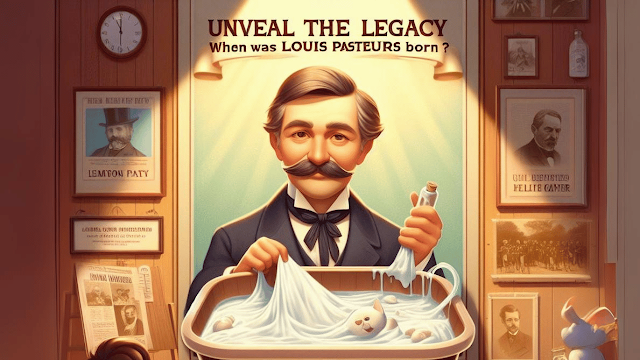Unveiling the Legacy: When Was Louis Pasteur Born, and What Did He Achieve?
The name Louis Pasteur evokes images of bubbling
flasks, triumphant scientists, and a world saved from rampant disease. But
beyond the iconic Pasteur pipettes and the ubiquity of pasteurization, lies a
tale of tireless curiosity, serendipitous discoveries, and a life dedicated to
the betterment of humanity. So, when was
Louis Pasteur born, and what groundbreaking contributions did he make to
the world of science and medicine?
When Was Louis Pasteur Born, and What Did He Achieve?
Unraveling the
Timeline: A Life Dedicated to Science
Born on December 27, 1822, in Dole, France, Louis
Pasteur lived a remarkable 72 years, leaving an indelible mark on the 19th
century. His journey began far from the gleaming laboratories, nurtured in the
small town of Dole. Though not initially an academic prodigy, Pasteur possessed
a keen intellect and a passion for sketching, foreshadowing his later
meticulous observations. In 1840, his path intertwined with science, leading
him to the prestigious École Normale Supérieure in Paris. It was here that his
scientific pursuits blossomed, culminating in a doctorate in chemistry in 1847.
1854: A Pivotal
Year and the Dawn of Germ Theory
The year 1854 proved to be a pivotal turning point in
Pasteur's career. While studying tartaric acid crystals, he discovered a
phenomenon that challenged the prevailing belief in spontaneous generation. He
observed two mirror-image forms of the crystals, proving that microorganisms
could influence chemical processes. This revolutionary finding laid the
foundation for his pioneering work on germ theory, stating that microorganisms,
not spontaneous generation, were responsible for fermentation and spoiling.
Unraveling the Web
of Discovery: A Legacy Beyond Pasteurization
Pasteur's relentless pursuit of knowledge led him to
uncover a treasure trove of scientific breakthroughs. He:
- Debunked the myth of spontaneous generation in fermentation, solidifying the germ theory and revolutionizing food and beverage production.
- Developed the process of pasteurization in 1864, saving the French wine and beer industries by eliminating harmful bacteria. This landmark technique not only preserved food but also paved the way for safer milk and dairy products.
- Pioneered the field of microbiology, meticulously studying the role of microorganisms in disease. He famously stated, "In the field of observation, chance favors only the prepared mind," highlighting his meticulous approach to experimentation.
- Developed vaccines for anthrax (1881) and rabies (1885), saving countless lives and proving the efficacy of immunization. His success with the rabies vaccine, derived from weakened rabies virus, marked a milestone in medical history.
A Legacy That
Lives On: Beyond the Numbers
Beyond the impressive timeline and list of
discoveries, Pasteur's legacy lies in his unwavering dedication to scientific
truth and his relentless pursuit of solutions to life-threatening problems. He
challenged established dogmas, embraced meticulous observation, and instilled a
spirit of scientific rigor that continues to inspire generations of scientists.
Recommendations:
Honoring the Past, Inspiring the Future
- To delve deeper into Pasteur's remarkable life and work, consider exploring:
- The Institut Pasteur in Paris, founded by Pasteur himself, which continues to be a global leader in medical research.
- Biographies like René Dubos' "Louis Pasteur: Free Lance of Science" or Jean Fourquet's "Louis Pasteur: The Pioneer of Microbiology."
Documentaries like "The Story of Louis
Pasteur" or "Louis Pasteur: The Man Who Killed Germs."
Louis Pasteur's life serves as a testament to the
transformative power of curiosity, dedication, and unwavering belief in the
scientific process. As we delve into the "when" and "what"
of his remarkable journey, we are reminded that his legacy transcends the
confines of historical dates and scientific breakthroughs. It is a story of
human ingenuity, a beacon of hope in the face of adversity, and a reminder that
even the smallest spark of curiosity can ignite a revolution in the pursuit of
knowledge and the betterment of humankind.
FAQs:
Q: How many years
did Louis Pasteur live?
A: Louis Pasteur lived for 72 years, from 1822 to
1895.
Q: What did Louis
Pasteur discover in 1854?
A: In 1854, Louis Pasteur discovered that
microorganisms, not spontaneous generation, were responsible for
fermentation, laying the foundation for germ theory.
Q: What is Louis
Pasteur most famous for?
A: Louis Pasteur is most famous for developing the
process of pasteurization, discovering vaccines for anthrax and rabies, and
his pioneering work on germ theory.
This article strives to answer the question "When
was Louis Pasteur was born?" in a comprehensive and engaging manner, while
also exploring the breadth of his scientific achievements and their lasting
impact on our world.
